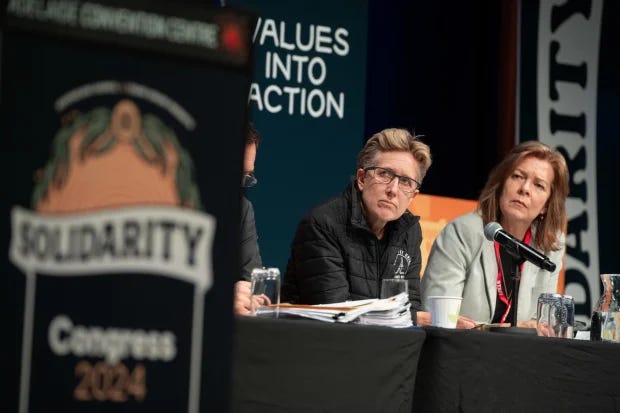There is power in a Union, right Sally?
The voice of Australian unions has been missing from the public call to end Israel’s genocide in Gaza, contrasting with global efforts abroad.

Rail freight, logistics, ports, and public transport have been shut down by unions in Italy, demanding end to Israel’s Gaza assault and breaking ties with Israel. The nationwide strike in Italy is one of many union actions occurring in countries like Greece, Belgium, Spain, Turkey, the United States and India, as dockworkers around the world join labour unions to take to take the power of the worker on to the powerful in their society who support Israels genocide in Gaza. In Australia, the union movement led by ACTU Secretary Sally McManus has been barely present, rejecting the Productivity Commission’s Skills Report, but choosing not to issue more than a dated statement about Israel.
The population of Australia has contributed to one of the biggest continuous demonstrations against Israel’s genocide on the planet, joining populations across the world in opposing the status quo, and national governments that keep it in place. These organic demonstrations across the West have been supported by unions, with workers front and centre, and populations in solidarity with their objectives. In Italy, we see this in action, as nationally coordinated strikes and blockades in dozens of locations, in Australia, according to the dated ACTU official statement on Gaza from April 2024, all we have are measureless of concern and condemnation in word form. And not much else.
As unions around the world carry out industrial action on the grand scale, confiscating cargo and occupying railway stations, Australian unions, led by McManus, have not issued a strike, a disruption, an endorsement of BDS, a lobbying campaign, hell, it can’t even seem to issue a rudimentary message of solidarity. The weekly demonstration across Australia have not been short of passion and dedication, but they have been short of union presence, who can barely be seen in the tens of thousands that march in our capital cities. A presence greatly missed, when that presence has helped to make the difference in marches of recent memory.
If you visit the iconic Victorian Trades Hall in Melbourne you will come across some of the most ornate rooms in the country. These days the ballroom, the lounge, the iconic Solidarity Hall are all available for hire with a range of packages suitable for corporate events, and the building inhabited by a range of trade unions, activist organisations, community groups, and cultural entities - but the building traditionally stood for something else. For over one hundred years Trades Hall acted like a palace for the sprawling Victorian workforce who lived in rudimentary dwellings, built in a time when Karl Marx was an unknown entity, and the eight hour working day was an Australian exclusive. Within its walls was a uniquely shaped Australian movement, where all a worker had was their profession, and each other.
Sally McManus has a big mullet and projects a radical complexion, but she has not steered her unions towards any meaningful action against Palestine. The ACTU’s responses are performative—strong on rhetoric but weak on leverage—failing to match the crisis’s scale. While the ACTU, and unions still call for ceasefires and hostage releases on letterheads two years into a UN declared genocide, Italy is blocking Israeli ships nationwide, South Africa is disrupting arms flows, and Australian unions are clearly not doing enough by comparison.
The ACTU’s alignment to Labor is the stand out factor in dictating their current course of action around the genocide. For nearly one hundred years the Australian Council of Trade Unions and the Australian Labor Party have worked in tandem, but it has been the post neoliberal environment fostered under Hawke-Keating in the 1980’s that forged the symbiotic and codependent relationship we see today. Post-Accord, the ACTU and the ALP made a pact that changed the nature of the union-ALP dynamic from adversarial to collaborative. In the decades since Unions have been brought into policy making decisions -- and rather than acting as actuators and motivators – have been converted into co-architects and key stakeholders.
The Australian union movement has fallen to the same problem impacting Australian society, the concentration of power in a land of powerful private interests and duopoly mindsets. Unlike European, Asian, and even American union movements, they have hitched themselves to the fate of one side of a titanic duopolistic political entity at the ALP, and look rigid in their response to a Labor government decision to support Israel, seeming reticent to act in a way that could hurt the political integrity of their stakeholder partner. One can only imagine if the unions would be behaving any different if a Coalition government was arbitrating over this unacceptable human catastrophe?
At present the genocide in Gaza is undeniable. The Italian national strike embodies the struggle of human populations against complicity in Israels ongoing actions. There are things workers can do, there is a rationale for returning to militancy to ensure their demands are met. And while countries around the world are reengaging with their proud union tradition as an avenue to real activism and protest, Australian unions, with the oldest and proudest histories of them all, are sitting under a mulleted gatekeeper at the ACTU that has continued a neoliberal unionist tradition of promoting those who prefer defanging the Australian worker for a guaranteed position in a political role or at a super board, over fostering passionate workers desperate to redefine the separation of the needs of the Australian worker from the interests of the ALP.
Curtailed by the life altering surgery of Howard’s Workchoices, coauthors of self-hobbling initiatives at unions work in liaison with Labor governments whom openly deracinate the proud union tradition from its footing under the guise of collaboration. Thanks to a bipartisan plan to walk Australian unions through a neoliberal field of rakes, the unions themselves, bleeding profusely from a self inflicted series of nearly a thousand cuts, have backed themselves into a corner where workers can’t even assemble outside of enterprise bargaining periods without facing harsh penalties. On the issue of Palestine, Zionist unionists threaten to shift allegiances over ‘unbalanced’ ACTU policy on Israel-Gaza, and factional infighting takes the place of solidarity.
So comprehensive is the defanging of Australian unions by those entrusted to preserve their legacy, so complete are the legal and consequential aspects that limit the ability of unions to assemble, that the actions seen in Italy, who once modelled its aspects of its proud trade movement on elements of our own (8 hour workday), seem radical and impossible to the Pavlovian Australian worker who has been shocked into thinking that a little bit of incremental wage increase without rocking the boat too much is the extent of what being in a union is all about.
Australia has one of the oldest labour movements in the world, it has a strong tradition of contributing to global solidarity efforts, not anymore. Australian unions have rewired themselves over the top of their members, changing the essence of the concept of a union itself, imposing a trickle down mentality on Australian workers, that seeks to have them walk between the narrow lines afforded to them by a disingenuous leadership with feet in both camps. The rewiring at the unions is a result of the remodelling of the Australian Labor party, who have commandeered the decisionmaking arms of Australian workers collectives, installing favourable union executives that urge their members to ‘play ball’ with big business, subjective media, and a bipartisan political class who want to see their demise.
The acquiescence of Australian unions around the two year genocide is palpable, especially when the memory of how they used to be lives on in many Australians. Sally McManus, and the neoliberal union leaders in Australia, pale in comparison to the trade union giants they call ‘comrade’ every now and then at some fancy lunch. Australians have come to understand the nature of the Labor government as a self-preserving political animal with no courage, they see the disingenuous media, and understand the motives the untrustworthy business, banking and mining sectors, but its taken a bit longer to apply these same labels to the unions.
To see unions deliver outdated statements and combinations of the same words being used in Canberra, rather than actions in the proud traditions of the dockworkers who helped to end apartheid in the 1980s, stands out in contrast to the global union action against Israel. As grandparents and children across the country do anything they can to raise awareness, to protest our government to do better, while everyday people take time out of their busy lives to declare their outrage towards Australia’s complicity in the genocide, its a kick in the pants to see the proud Australian unions pleading ignorance. Its shameful seeing them offering platitudes in the vein of Penny Wong rather than warnings in the key of Pat Geraghty.
People in the bubble of Canberra, and the personality types that inhabit executive roles in our unions, may forget that before this crumbling sheen of neoliberalism was a country engaged in a fierce history of IR and trade disputes. The spirit of the Eureka stockades, of the pig iron refusal, the courage anti-apartheid dockworkers, runs deep under the fading neoliberal patina that was powdercoated over the intricate galvanised ironwork of our labour history. Unions should fight governments for outcomes rather than parlay with them for compromise, and the cleavage of the ALP from party and union members particularly over Israel, reveals the total dysfunction of the relationship, pitting them for eventual contest. And just like the Italian decision not to recognise Palestine acted as a catalyst for their national union-led shutdown, Australian unions deciding to sit on the sidelines during a genocide, may act as a catalyst for the workers to take them back.




Thank you Joel for your analysis.
It is clear that many union leaders in Australia are very comfortable with their invitations to these Canberra summits. They see that their football team in Labor has won and that is the end of their involvement in solidarity for the people still suffering under neoliberalism, and capitalistic imperialism.
In many ways, the unions have for a while collaborated with Government and the bosses to negotiate terrible enterprise bargaining agreements.
Excellent piece Joel 👍
Yes and yes to every word you wrote . 💯💯